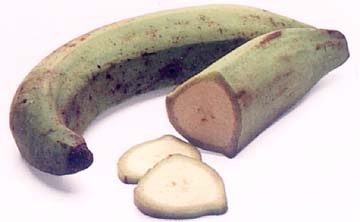

Key Ingredient

KEY INGREDIENT: PLANTAINS
In Hawaii we are accustomed to eating bananas as fruit almost daily. But in some parts of the world, consuming bananas as a vegetable is more prevalent.
The starchy vegetable-like banana, or plantain, is actually a close cousin of the sweet fruit variety. Although plantains are fruit, they are most often cooked and consumed like potatoes.
The basics: Plantain, also known as "cooking banana," is said to be one of the earliest fruit crops to originate in Asia and the Pacific. Plantains, like bananas, are technically the fruit of the largest herb plant, not a tree.
The plantain is generally larger and sturdier than a banana, with a thicker outer skin. Because it is cooked and not eaten raw, it is ideally consumed when green. It is very popular in Latin American countries, as well as parts of Africa, Asia, India and the Pacific.
Plantains have a mild, almost squash-like taste, with only a hint of banana flavor. There are many other varieties of cooking banana, including a smaller red variety that is popular here.
Plantains are high in carbohydrates and are a rich source of potassium and vitamin C.
Selecting: Choose plantains that are green to brownish black. Green plantains will be quite firm. The darker or riper fruit will have a softer flesh, but will still be firmer than a banana. Watch out for bruised or moldy fruit.
Storing: Plantains should be stored like bananas and can be kept at room temperature for several days.
Use: Use a knife to cut a horizontal line in the skin for easier peeling. Or slice into half-inch rounds and remove skin from the rounds. Plantain recipes most often call for sautéing in butter or deep-frying. They can also be baked in the skin and served like a baked potato.
Plantains may also be used in soup, stews or steamed with rice.
Where to buy: Plantains are available year-round and can be found in most supermarkets next to bananas. They are pricier than bananas, ranging from $1.99 to $2.99 a pound.
Food Stuffs: Morsels
Eleanor Nakama-Mitsunaga is
a free-lance food writer. Contact her
online through features@starbulletin.com